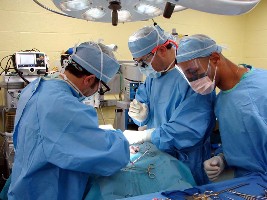Economists and medical researchers at Rice University and MD Anderson Cancer Center in Houston found complications experienced by cancer surgery patients, while infrequent, can result in very high financial costs. Health economist Vivian Ho, at Rice’s Baker Institute for Public Policy, with Baker Institute research analyst Marah Short and MD Anderson cancer surgeon Thomas Aloia, published their findings online last week in the journal Cancer.
Cancer surgery, often for removal of tumors, involves complex procedures that contribute to a large and growing cost of cancer care, brought on by the aging U.S. population, as well as expensive medications, and advanced diagnostics. That expense, according to data cited by the authors, is expected to reach $207 billion by the year 2020.
Ho, Short, and Aloia focused on one type of expense so far not studied in much depth, namely the costs of complications from cancer surgeries. The authors investigated Medicare claims data for the years 2005 to 2009, for six types of operations covering colorectal, lung, pancreatic, and esophagal cancer. The team merged data on hospital expenses from Medicare with data from insurance carrier records to capture physician costs.
The researchers identified complications through patient safety indicators, a comprehensive list of complications and adverse events developed by the U.S. Agency for Healthcare Research and Quality. The indicators are designed to help health care providers track quality problems using information found in typical administrative records, such as discharge reports.
The authors found rates for complications ranged from very few for post-operative hip fractures (0.01 percent) to more common, but still infrequent respiratory failures (2.6 percent). In addition to respiratory failures, more than 0.5 percent of the cases recorded serious problems including post-operative blood clots (pulmonary embolism or deep vein thrombosis), bedsore ulcers, and accidental punctures or lacerations. In addition, 1.4 percent of the cases died from various complications considered treatable.
While the rates of complications were relatively infrequent, the impact of these complications on costs to stakeholders is significant. Using regression analysis adjusted to accommodate risk factors, the authors calculate three types of complications — blood clots, bedsore ulcers, and death from treatable conditions — raise costs by 20 percent or more for most types of surgery. Post-operative respiratory failure, say the authors, raises costs by more than 50 percent across all types of surgery.
“In our study,” says first author Marah Short in a university statement, “we found consistently higher costs associated with cancer surgery complications. Improved patient outcomes and substantial health care savings could be achieved by targeting these complicating factors for quality improvement.”
Read more:
- Network Analysis Shows Drug Resistant Infection Factors
- Health Reform To Cut Out-of-Pocket Costs for Newly Insured
- Quality Incentives Found Effective for Health Care Outcomes
- Top Hospital Infection Costs Estimated at $9.8B Per Year
- Cancer Care Plans Help Survivors Make Lifestyle Changes
* * *


 RSS - Posts
RSS - Posts
You must be logged in to post a comment.